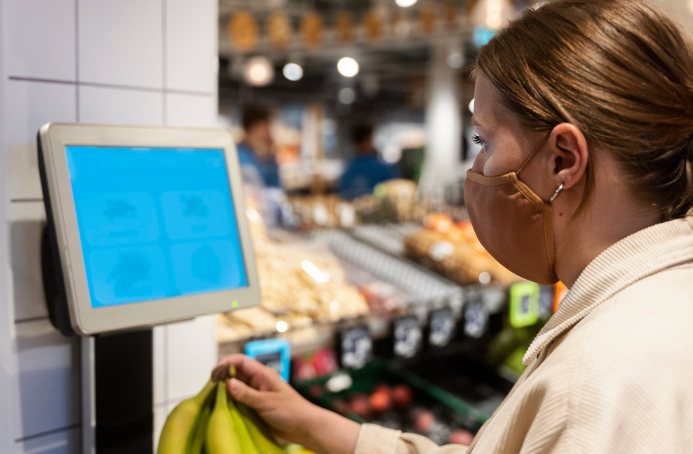
A fundamental shift is taking place in the restaurant business as self-service kiosks proliferate. While the advantages for clients are apparent—fewer wait times, customised ordering, and more control—the effect on employees is just as significant. Food and beverage retailers and operators face a number of challenges, including rising salaries, labour shortages, supply chain conflicts, and inflation.
According to the National Restaurant Association’s 2023 State of the Restaurant Industry study, the need to hire more people and increased costs are the biggest concerns affecting restaurant operators. Self-service ordering kiosks have the potential to significantly increase employee happiness and efficiency by simplifying operations and redefining employee responsibilities.
1) Reduced Stress and Improved Workplace Satisfaction
Frontline staff members experience less stress due to self-service kiosks, one of its most immediate advantages. It can be quite stressful to be under pressure to take directions precisely and swiftly constantly. This load is lessened by kiosks, freeing up staff members to concentrate on jobs that call for knowledge and personal connection.
- Better Work-Life Balance: Employees can devote more time to other facets of their roles because kiosks handle a large amount of order taking, improving work-life balance.
- Increased Job Satisfaction: Kiosks relieve workers of monotonous duties so they can concentrate on more satisfying responsibilities like food preparation and customer service. This can improve morale and job satisfaction.
- Decreased Burnout: Taking orders under duress is a high-pressure job that can lead to burnout. By lessening the strain on employees, kiosks can help minimise this and create a more sustainable and healthy work environment.
2) Enhanced Productivity and Optimised Processes
In addition to raising worker happiness, self-service kiosks have various advantages for operations:
- Faster Order Processing: By reducing order processing times, kiosks can improve customer satisfaction and expedite table turnover.
- Decreased Order Errors: Kiosks help decrease order errors, minimise food waste, and boost customer satisfaction by removing the possibility of misunderstandings between patrons and employees.
- Optimised Staffing Levels: Restaurants can achieve cost savings and better resource allocation by optimising worker levels when kiosks handle a portion of the ordering process. This is because kiosks can provide real-time data on customer flow and ordering patterns, allowing managers to adjust staffing levels accordingly, thereby reducing unnecessary labour costs and improving service efficiency.
- Data-Driven Insights: Kiosks offer valuable facts on buyer choices, high-ordering instances, and popular menu gadgets. These records may be used to optimise staffing schedules and improve standard restaurant operations.
3) Upgraded Roles and Responsibilities
As self ordering kiosks take over routine tasks, the function of the eating place workforce evolves:
- Focus on Customer Experience: With much less time spent on order taking, a group of employees can dedicate more time to supplying remarkable customer service, constructing relationships with customers, and addressing their specific wishes.
- Enhanced Problem-Solving: With kiosks handling routine tasks, employees can focus on resolving customer issues, managing complex orders, and providing guidance on menu options. This shift in responsibility requires a higher level of problem-solving skills and can be more rewarding for staff, as they can provide more personalised and attentive service to customers.
- Opportunities for Upselling: Staff can use their expertise to indicate additional options or upsell clients on top-class alternatives. This requires a more profound know-how of the menu and the ability to construct rapport with clients.
Extra Benefits for Employees and the Company:
4) Employee Development and Empowerment
- Enhanced Autonomy: Self-service kiosks allow staff members to assume responsibility for their work and make choices that will improve the client experience.
- Enhancement of Skills: Restaurants can engage in training programs that emphasise product knowledge, upselling strategies, and customer service to support their workforce’s changing roles. A workforce with greater competence and versatility may result from this.
5) Making Decisions Based on Data:
- Optimal Scheduling: Restaurants can optimise staffing schedules and cut labour expenses by analysing peak ordering times and customer traffic patterns using data from their kiosks.
- Menu Optimisation: Restaurants can boost profitability by analysing popular and unpopular menu items and using that data to inform data-driven decisions regarding menu changes and promotions.
In conclusion, it is a win-win situation for both Clients and Employees
Self-service ordering kiosks can revolutionise the restaurant industry and benefit customers as well as staff. Kiosks contribute to a more positive and productive work environment by lowering stress, increasing productivity, and freeing up personnel to concentrate on higher-value duties. In the end, this results in contented staff members who can deliver outstanding customer service, raising client happiness and loyalty. Employees’ roles in restaurants will change as technology advances and self-service kiosks will significantly influence the sector’s future development.
